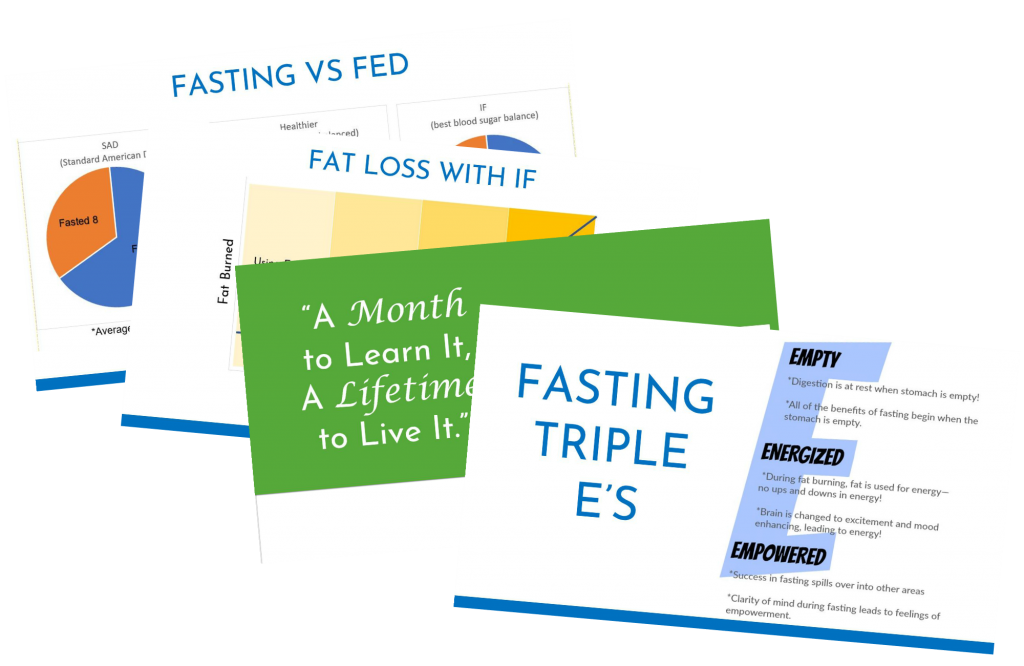Donna is the Intermittent Fasting guru on our team! She gives you all the basics here.
Intermittent Fasting is not so much an eating protocol as it is a way of life. It is simply eating during certain hours (much fewer hours than we traditionally do) and not eating during certain hours (much more than we traditionally do).
We usually look at IF in terms of “fasting hours” and eating hours. When someone says they fast 16:8, this means that they fast sixteen hours and eat eight hours out of every twenty-four hours. Others might do 19:5 (fasting 19; eating 5) or even 20:4 (fasting 20; eating 4).
Intermittent Fasting promotes weight loss or weight management. (My husband and I have lost nearly 170 pounds in the past two years on it!) But it is also incredibly healthy, even potentially warding off diseases, bringing insulin down to healthy levels, clearing up brain fog and other brain issues, and much more. We feel amazing on IF!
There are primarily five ways that people lose weight/control cravings/reduce inches on IF:
1) We Lose Weight When Appetite Correction Sets In
After 3 to 4 weeks of consistent Daily Intermittent Fasting, a process
called Appetite Correction sets in. During the first few weeks, people
wonder how they will ever lose weight eating everything they want during
a three five , four, or five hour eating window. However, Appetite Correction
happens when we balance our hormones through Intermittent Fasting and we
quit wanting to eat everything in sight.
Appetite Correction is a built in monitoring system, a natural boundary
for us without us having to count anything or try to manipulate our food
too much. We crave healthier foods with Appetite Correction, and by
eating healthier foods, we are not eating as much junk. This results in
weight loss. Moreover, Appetite Correction causes us to just be “done”
eating when we would normally keep on eating more desserts and more
treats at the end of our eating window.
2) We Lose Weight When Fat Adaption Happens
Daily Intermittent Fasting causes us to become Fat Adapted. Fat Adapted
means that each day during our fast, we use up our circulating
glucose and/or glycogen stores and start burning body fat rather than
burning the food we just ate. That is, the food we ate yesterday gets
burned up during the fast somewhere between the 12 and 16 hour mark, and our body
goes into Fat Adaption where we burn our body fat for fuel.
This is when real weight loss occurs because this is similar to when the
body goes into ketosis during a low-carb diet (keto diet). Our body
moves seamlessly from burning circulating glucose and glycogen stores
into burning its own body fat for fuel. Usually someone has to follow a very
low-carb diet, such as 20 to 30 carbs a day, and/or much interval and
high intensity exercising in order to burn body fat. Daily Intermittent
Fasting does it for us naturally.

3) We Lose Weight When We Organically Eat Fewer Treats
When we start to do Daily Intermittent Fasting consistently, the
combination of Fat Adaption and Appetite Correction and seeing our body
shrink through fat burning causes us to organically eat more healthily.
We stop wanting junk food as much, though we have the freedom to have
treats, and we do not overeat as much.
Treats become just as they were intended to be – treats. We do not
eat so many of them so that we have way too many calories in any given
day. We organically and naturally eat better, and we lose weight in the
process.
4) We Lose Weight When We Naturally Eat Fewer Carbs
A smaller eating window of three, four, or five hours will naturally
yield fewer carbohydrates. It is thought that the average person eats
300 or 400 carbohydrates in any given day. A short eating window will
often find the Intermittent Faster eating between 100 and 150 carbs per day.
While 150 carb sounds like a lot of carbs compared to the keto diet of 30
carbs, the fewer carbs we eat (along with moderate protein), will
reduce the amount of circulating glucose and the amount of stored
glycogen. This means that we will go into that Fat Adaption, or body fat
burning, earlier….sometimes even at the 12 hour fasting mark for non-keto people.
5) We Lose Weight Over Time When We Create Even a Small Calorie
Deficit and Then Have Motivation From the Weight Loss
When we have shorter eating windows of three, four, and five hours, and
we also have Appetite Correction, we will have a calorie deficit many
days of the week. So even without considering being Fat Adapted, eating
fewer carbs, consuming fewer treats, having Appetite Correction, etc.,
we are creating a calorie deficit every week.
If a person stays on Daily Intermittent Fasting consistently, overtime,
that person will naturally lose weight from a small calorie deficit in
addition to all of the other perks of weight loss that occur with Daily
Intermittent Fasting. And….weight loss breeds more weight loss. Success leads to more success.
I love helping women lose weight and feel great! Get free videos, charts, and more when you subscribe to my website: donnareish.com
I teach fasting, weight management, food choices, and life coaching skills at my blog AND in my private FB group: https://www.facebook.com/groups/318664198605086/?epa=SEARCH_BOX

Donna Reish is a homeschooling veteran of seven kids over thirty-two years, wife of thirty-eight years, curriculum author of over 100 books, weight loss coach, language arts blogger, weight/Intermittent Fasting blogger, Christian, and Nonna to six grandbabies. You can read a full bio here.


